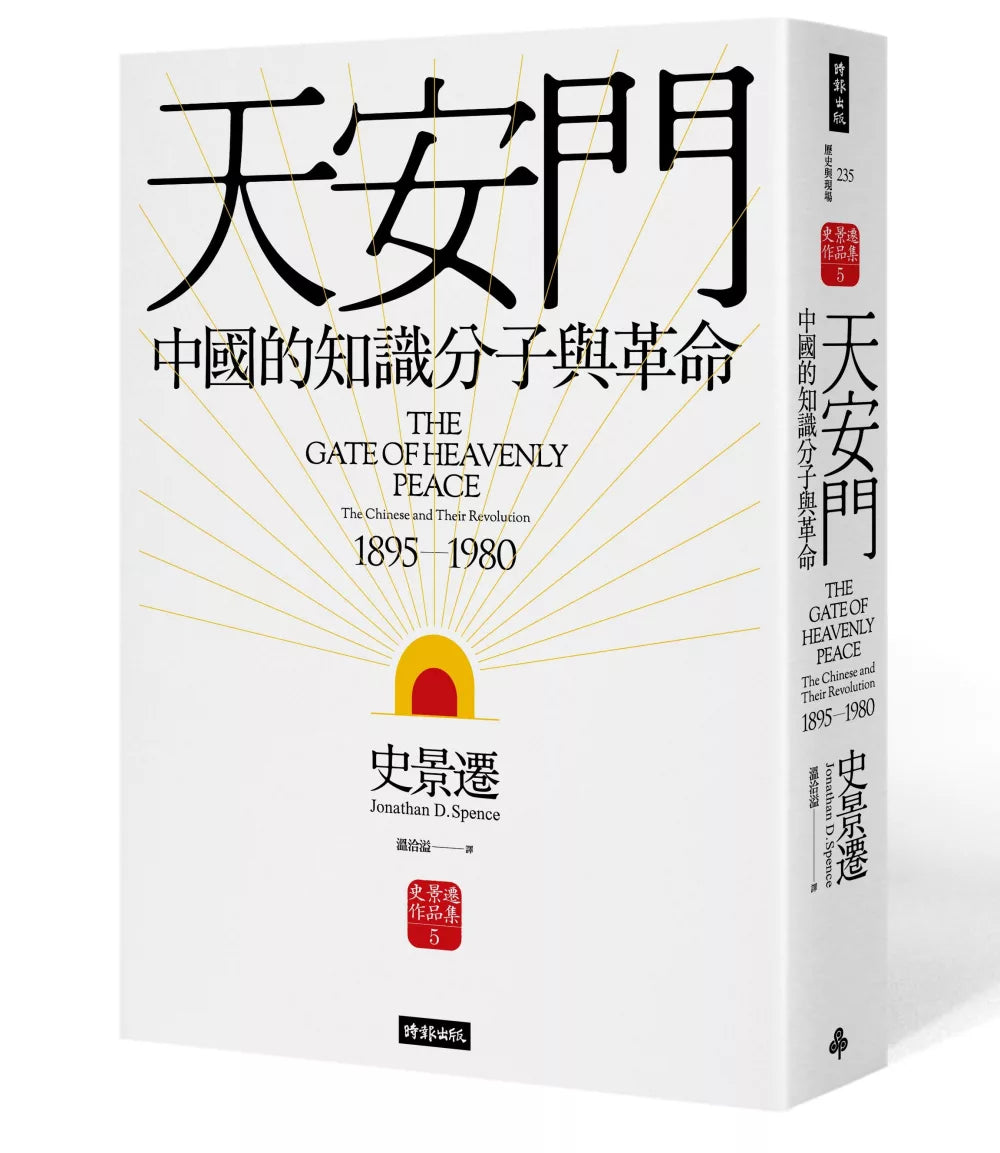1
/
of
1
Tiananmen: China's Intellectuals and Revolution
Tiananmen: China's Intellectuals and Revolution
Jonathan Spence Wen Qiayi 译
Regular price
$31.99 USD
Regular price
Sale price
$31.99 USD
Unit price
/
per
Out of stock
Couldn't load pickup availability
About Book
About Book
The Gate of Heavenly Peace: The Chinese and Their Revolution, 1895-1980
The dramatic changes in China's destiny over the past century and the hopes and regrets of intellectuals in the Republic of China in CangsangThe best storyteller:
Jonathan Spence's masterpiece
"A milestone in Western Sinology." — John King Fairbank
"It is indisputable that Jonathan Spence's works must be classified within the category of the Records of the Grand Historian." - Yu Ying-shih
★ Los Angeles Times History Book Award ★ New York Times Top Ten Non-Literary Books of the Year ★ China Times Open Book of the Week ★ Golden Tripod Award for Best Translation in Books ★ Yu Yingshi's preface. Highly recommended
This is the story of China's intellectuals, a sweeping epic tragedy and comedy, chronicling the dramatic transformations of China between 1895 and 1980. From the late 19th-century attempt by a group of reformists to reform the Qing court to the fall of the Qing dynasty, culminating in the conflict between monarchists and revolutionaries; from the early 20th-century conflict between the Republican government and the warlords to the tragic struggle between the Kuomintang and the Communist Party; from China's fall and restoration in the 20th century to the Chinese government's radical rural and cultural transformations. China's intellectuals were the driving force behind these transformations, yet they were also engulfed by them. This is an unprecedented tragedy in Chinese history, yet the performance also reveals a sense of helpless and self-deprecating comedy at times.
Jonathan Spence carefully selects a handful of the most representative figures for in-depth exploration, weaving together a cohesive portrait of the Chinese spirit. Kang Youwei, Lu Xun, and Ding Ling serve as the book's central threads, while Qiu Jin, Shen Congwen, Qu Qiubai, Xu Zhimo, Wen Yiduo, and Lao She appear at different stages, forming the book's vertical threads. Amidst the intersection of longitude and latitude, countless related figures come and go at any time, including the unavoidable political leaders Sun Yat-sen, Chiang Kai-shek, Wang Jingwei, Mao Zedong, Zhou Enlai, Liu Shaoqi, and Deng Xiaoping; the cultural leaders who led the fashion of the time, Zou Rong, Liang Qichao, Cai Yuanpei, Chen Duxiu, Li Dazhao, Guo Moruo, Hu Shi, Liang Shuming, Mao Dun, Lin Huiyin, Hu Feng, etc.; even foreign visitors such as Bertrand Russell, Rabindranath Tagore, and Bernard Shaw have made some appearances.
Each character in this book possesses a unique perspective and vitality, far beyond the reach of a collective biography. With his vivid pen, Jonathan Spence sketches their lives, focusing on the intellectuals' exploration and reflection on their own identity amidst the profound changes of the times. He also allows readers to understand the extraordinary series of events and the "Chinese Revolution" that these events accumulated. As these characters are caught up in the violence and rebirth of modern China over the past century, Jonathan Spence, using the historical and culturally rich title "Tiananmen," travels across a century, evoking the blossoming intellectual thought and spirit of the times.
The title of the book is "Tiananmen", which shows that he has keenly noticed:
The historical function of Tiananmen Square is undergoing a dramatic change.
One could even say that he had foreseen the tragic massacre in front of Tiananmen Square ten years later.
- Yu Ying-shih
Celebrity recommendations
A milestone in Western Sinology. —John King Fairbank
That Jonathan Spence's work must be categorized within the same genre as the "Records of the Grand Historian" is indisputable. The "Records of the Grand Historian" is not only a masterpiece of Chinese historiography but also a supreme example of Chinese literature. For forty years, Jonathan Spence wrote one historical monograph after another, spanning the late Ming Dynasty (such as "Rimasau's Palace of Memory") and the end of the 20th century (such as "Tiananmen"). In 1990, he wrote a best-selling general survey of modern Chinese history, beginning with the late Ming and concluding with the Tiananmen Square democracy movement in 1989. This encompasses the full scope of his lifelong teaching and research, spanning four centuries. In each of these centuries, he chose one or two specialized themes, crafting vivid narratives that paint a vivid picture of the spirit of that era, both directly and indirectly. This is the true skill of a historian, and the ultimate destination of history. From what I've read, among contemporary scholars studying modern and contemporary Chinese history, only Sima Qian seems to possess this unique ability. Why? I think it's because he not only possesses profound historical expertise, but also a literary legacy that surpasses his peers. "Combining talent in literature and history" is precisely the path Sima Qian blazed in the history of Chinese historiography. --Yu Yingshi
book review
"An absolutely superb work; bold in form and rigorous in content, it captures the ups and downs of life with passion." —Saturday Review
With astonishing power, he composed a wondrous symphony that achieved what traditional history could never achieve, telling the world about the pain of a nation. —Harrison E. Salisbury, Chicago Tribune Book World
With the novelist's acumen and the historian's disciplined pursuit of truth... this book offers a comprehensiveness, a vividness, a humanity unmatched by any other. —Library Journal
Publication Date
Publication Date
2016-05-24
Publisher
Publisher
時報出版
Imprint
Imprint
Pages
Pages
584
ISBN
ISBN
9789571366241
share

